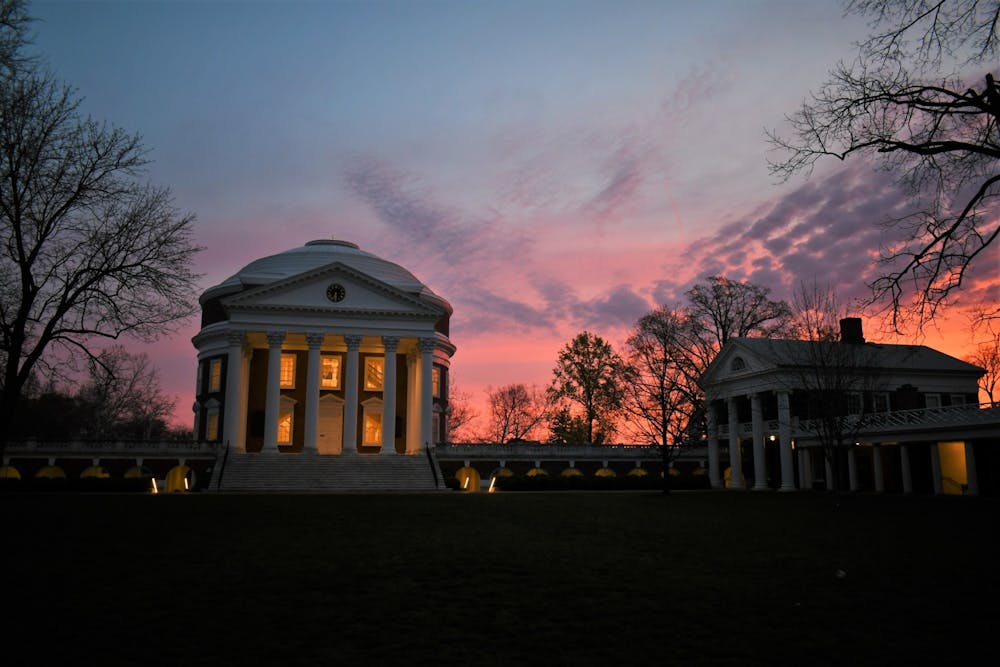In the basement of Wesleyan Methodist Church Tuesday evening, about 100 students and Charlottesville community members gathered with pizza and music, learning from each other in a teach-in and open mic event which gave attendees a safe space away from a controversial speaker being hosted on Grounds at the same time.
The event was organized by Political Latinxs United for Movement and Action in Society, the Young Democratic Socialists of America at U.Va. and the Queer Student Union, in conjunction with the Black Student Alliance, United Campus Workers at U.Va., Central Americans for Empowerment at U.Va., Dissenters at U.Va. and Decolonize U.Va., along with numerous local Charlottesville community groups.
Sarandon Elliott, co-chair of YDSA’s National Coordinating Committee and fourth-year College student, told The Cavalier Daily that the main goal of the event was to provide a safe space for community members and students to assemble and get “tapped into” organizing on and around Grounds.
“Pretty much anything wonderful and transformative that's happened at the University has come through student organizing and workers organizing,” Elliott said. “We wanted to really get into that.”
The event was planned following the announcement that former vice president Mike Pence would be hosted by the University’s chapter of Young Americans for Freedom at Old Cabell Hall as part of the Young America’s Foundation’s Ken and Janice Shengold Advancing Freedom lecture series.
Following the announcement, the University became the center of national attention after an editorial published by The Cavalier Daily drew controversy and responses from faculty and students alike, both in support of and against the piece.
YAF has previously drawn attention for posting selectively-edited videos of a Student Council meeting, which led to the harassment of several representatives of color, and garnered criticism for an event it hosted in November titled “In Defense of Mr. Jefferson” which students said overlooked Jefferson’s history of enslavement.
Ella Tynch, chair of YDSA at U.Va. and third-year Education student, said organizers planned the event not necessarily as a counter to Pence’s speech but instead, as a chance for attendees to learn about organizing, “building working class power” and “enjoy a sense of community.”
“'We're not going to try to protest the event by standing in front of it with signs … because that is what they want,” Tynch said. “What they want by holding that event is to divide our community.”
Elliott echoed this sentiment, noting that “either way we are resisting” and emphasized the importance of building up organizing infrastructure even during more “normal” times.
Safety for everyone at the solidarity event was “the main priority” for organizers — Elliott and Tynch said they asked attendees not to take photos or videos, ensured there were rides available to and from for students who felt uncomfortable walking late at night and had security at the event itself.
“We put a lot of time and effort into considering safety,” Tynch said. “I'm very thankful to Charlottesville community members who were able to come out and be a part of our safety team because my largest concern [was that] Central Grounds garage is right across the street [from the church].”
Attendees were greeted first by a number of organizations who set up to table outside the church and were encouraged to grab pizza and listen to music from a live DJ before the event began with a teach-in at around 6 p.m. Anushka Dar, intersectionality chair for QSU and first-year College student, said she helped facilitate the teach-in alongside a professor in the sociology department, who answered questions from students about conservatism, right-wing policy and the politics of free speech.
After the teach-in, attendees were invited to share poems, stories or thoughts in an open mic portion. Many speakers noted their gratitude to the church for allowing them to gather in a safe and welcome space.
“One thing I want to mention is that several people at the open mic portion of the event mentioned that it was personally very significant to them that it was held in a church because they grew up in less accepting church and faith communities,” Tynch said. “I do want to thank that church for being so welcoming and so open to us being there.”
Participants trickled out around 8 p.m., grabbing pizza for the road and rides from drivers who volunteered to take attendees home or to dorms afterwards. Tynch expressed gratitude to all of the people who made the event successful, including YDSA and QSU’s executive boards and specifically first and second years in those positions of leadership who stepped up and stayed behind to clean up after the event.
As one of those first years, Dar — who will serve as QSU’s vice president of outreach and activism next year — in turn said she has learned a lot from the upperclassmen who organized the event and is grateful for their leadership in organizing efforts on Grounds.
“Seeing upperclassmen be so dedicated and passionate really inspires me to get more involved in political action and organizing in general on Grounds because there's so much work to be done,” Dar said.
Elliott emphasized the importance of student-led activism in response to hatred and bigotry and the value of organizing in general.
“It's not admin, it's not donors, it's not politicians, it’s not individual activists that are gonna really bring about the change that we need at the University,” Elliott said. “It's always been students — it's always been to the masses.”







